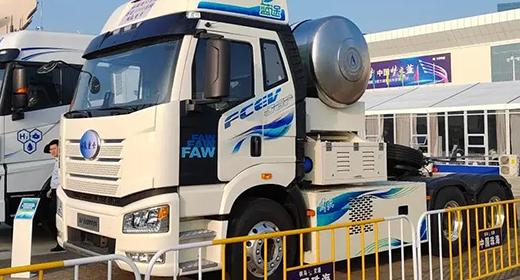Breaking 1,000Km Barrier Without Refueling
- China has successfully tested its first heavy-duty truck powered by a 100kg liquid hydrogen system, enabling a driving range of over 1,000km without refueling.
- The “Track 1000” system, developed by CASC’s 101st Institute, is now heading into real-world trials in the Panzhihua liquid hydrogen demonstration zone.
By FCW Team: China has fired the starting gun on a new era of long-distance hydrogen-powered freight transport with the successful trial of a 100kg liquid hydrogen fuel-cell truck capable of going more than 1,000km (621 miles) without needing to stop.
The groundbreaking system — named “Track 1000” — was developed by the 101st Institute of the Sixth Academy of China Aerospace Science and Technology Corporation (CASC), and integrated with a FAW Jiefang heavy-duty truck. The setup includes a 300kW liquid hydrogen fuel cell paired with a 100kg LH₂ storage tank.
This marks China’s first independently developed 100kg-class onboard LH₂ system and has now completed “sports car tests” using the FAW Jiefang Blue Path “Xingyi” hydrogen fuel cell tractor. With its strong output and performance benchmarks, it’s being hailed as a milestone in the evolution of LH₂-powered heavy vehicles.
“The pinnacle of technology! my country’s first 100-kilogram vehicle-mounted liquid hydrogen system →” boasted local media in typical fashion.
The rollout forms part of the Panzhihua Liquid Hydrogen Application Demonstration Zone — an ambitious plan to trial this system in real-world logistics using more hydrogen trucks and fueling stations. CASC’s 101st Institute is partnering with other major players in the hydrogen value chain to move the sector forward.
Already, national technical standards are in place. The “Safety Requirements for Vehicle Matching of On-board Liquid Hydrogen Systems” and “Beijing local standards for Liquid Hydrogen Refueling Procedures for Fuel Cell Electric Vehicles” — both authored by the 101st Institute — are being applied, laying the groundwork for commercialisation.
At the heart of “Track 1000” lies a quintet of engineering breakthroughs that define what CASC claims is the cutting edge of mobile LH₂ technology. A third-party observer confirmed core data: aerospace-grade cryogenic insulation with less than 3% static evaporation rate, stable pressure management during operation, and hydrogen storage density of 10%, enabling efficient long-distance travel.
Further advantages include a lightning-fast supercritical transient response of 4kW/s and fuel cell hydrogen pressure consistently above 1.3MPa. For the first time, full integration of system diagnostics into the vehicle powertrain is realized. The system has also undergone significant weight reduction compared to the first-generation unit, raising total LH₂ capacity into the “hundreds of kilograms” range.
Trial Run with FAW Jiefang Truck Yields Industry-Leading Metrics
CASC and FAW Jiefang completed their combined vehicle and system tests in Beijing, proving the system’s capabilities in motion. The 300kW LH₂ fuel cell performed with a consistent hydrogen supply pressure of over 1.3MPa. For the first time, the liquid hydrogen nozzle executed a full automatic purge and replacement cycle before refueling — a key milestone in leak-free operation.
Work has already begun on the next iteration of the system. A side-mounted LH₂ configuration has been optimized for space, improving volume efficiency by 35%. Boosted by advancements like the adiabatic coupling algorithm, the system now targets evaporation rates below 2%, while supporting a broad range of fuel cell types. Compatibility is also being expanded for multiple LH₂ cylinder designs — including saturated and sub-cooled versions.
Deployment is next on the list. “Track 1000” will now be tested in the field as part of the Panzhihua LH₂ application demonstration zone, offering China a platform to refine the tech before scaling up commercially.
From aerospace R&D to zero-emission logistics, from national key innovation projects to a functional demonstration of heavy-duty liquid hydrogen freight, this system is emblematic of China’s vertical integration of the LH₂ value chain. With hydrogen trucks edging toward demonstration-level use, “Track 1000” is carving a path toward scalable, sustainable freight powered by liquid hydrogen — and redefining the clean transport narrative in the process.










































